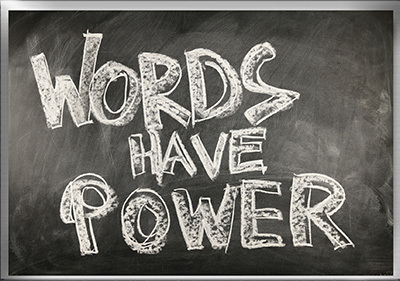The Power of Words


The Power of Words
Last week former President George W. Bush warned against the "casual cruelty" in our nation's discourse these days. He was warning against caustic language and damaging words.
Words have been on my mind all month because at this time of year, the Torah focuses upon their power.
Take the opening passages of the Torah itself, in which the world is created via language: "Yehi Or!" "Let there be light!" Yes, in our telling of the creation story, the universe comes into existence by way of verbal utterance. Our "Big Bang" is a big pronouncement. This is not to refute science. It is to teach us that words are so powerful that they can create worlds. We also know that words are powerful enough to destroy.

Consider how on the playground children will defend themselves against mean spirited language by saying, "Sticks and stones will break my bones but words will never harm me." It is a clever response but completely untrue. Few adults remember the physical pain from a scratch or scrape the way that they remember the sting of mean words hurled at them.
The second Torah portion, Noah, tells yet another story about speech. The Tower of Babel is built by people ambitious to reach the heavens. In an effort to explain why the earth is filled with so many different languages, the story goes that God adds languages to humanity to deter people from communicating well enough to grab too much power.
But my favorite Jewish text on the subject of speech is found in our prayer book. After the Amida, an extremely long prayer that is said both to oneself as well as aloud during Jewish prayer services, we come upon the following text:
"My God. Guard my tongue from evil and my lips from speaking guile. And to those who slander me, let me give no heed. May my soul be humble and forgiving to all. Open my heart, O Eternal, to Your sacred law, that Your statues I may know and all Your truth pursue…May the words of my mouth and the meditations of my heart be acceptable to You, O Eternal, my Rock and my Redeemer."
In this prayer, known as the "Elohai," we seek to avoid misusing our tongues and mouths to speak bad words about others. Is this just a prayer for avoiding gossip? Or is it more? How do we wish to use our "air time" with people, especially those closest to us? Do we want to waste a lot of time venting about others, speaking negatively to or about people, or do we want to use our "air time" elevating those around us with words of praise, gratitude and encouragement?
I have always believed that the reason that religious prayers offer praise of God and words of thanksgiving and awe is not because God needs to get a compliment. These prayers are designed to have us practice saying beautiful and kind things—for ourselves and each other.

Skirball Director of Spiritual Life
[email protected]